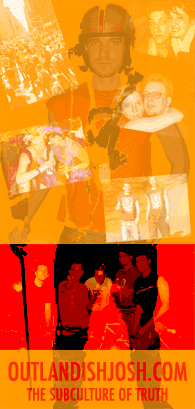
| Outlandish: The blog |
| About: Who is this guy? |
| Life: The adventure of a lifetime |
| Art: My church |
| People: Make it worthwhile |
| Politics: The art of controlling your environment |
| Work: Necessity, purpose, honor |
| Contact: Only connect |
|
|

|

|
|
Outlandish Bulletin: |

|
|
|
Vintage Outlandish!
This Content From 2003 (or earlier) see index
| [outlandish] | [my story] | [love] | [sin] | [places] | [philosophy] |
EvolutionEvolving systems to work for The Light I just read a cool article about a computer scientist in England who's been experimenting with self-evolving chip designs. He's "bred" a chip that can tell the difference between two audio tones, but the really spookily thing is that he doesn't know how it works. This could not only result in really smart machines, but also might help us understand how we got to be where we are, for life and the human mind-body-machine seem to have come about through a similar evolutionary process. The only difference is that we're on about a 22-year generational cycle, and the machines can run through 4000 generations (more generations than are recorded even in the deepest human history) in a few weeks. It's science fiction come to life! This is really a time-honored trope in sci-fi, the machines evolve to be self-aware and then pass some kind of judgement on their human masters, much the way that children pass judgement on their adult parents. It's an interesting thing to wonder about: how a foreign intelligence would judge our collected history and culture. Would we appear heroic, or at least affable as I recall there being a episode of Star Trek the Next Generation about, or would our warlike nature do us in as posited, albeit in slightly different forms, in the Terminator films, The Matrix, and Keubric's 2001? It's at least worth a few thought cycles to ponder. Getting to the practicalities of the matter, this phenomenon of self-evolving hardware systems is an encredibly exciting prospect. Despite the inherantly suspect western ism in a dialectic mode of thinking, I'm a big believer in progress. It seems to me that the universe is developing new and better ways to turn out different and contrasting things. George Carlin once had a stand-up bit about why humans evolved. It wen something like: "Why are we here? Plastic! Mother nature says, 'Hey, I need some plastic around here,' so she squirts out humans to drill for oil, make a bunch of plastic that will be around for a while, and then all kill each other off! We don't have to 'save the earth', that's bullshit. We have to save the Humans. The earth is going to be here pretty much no matter what we do. And if we pass on, the plastic will remain with it." I take a slightly different view on things. Influenced by Buckminster Fuller, I think that life, and intelligence in particular, has the unique potential to be a counter-entropic force. Entropy is about the closest thing I can think of to evil in the world of physics. It's odd, because in most things I encourage miscegenation, which is the metaphysical equivalent of entropy, but that's because in the metaphysical world, we don't live in a thermodynamic world, and new things are always being created and everyone has a potentially unlimited pipeline to the infinite mother load of chi. That's the counter of miscegenation: the more you mix things up, the more cool new contrasts evolve out of it. A little revolution is healthy. But in the physical world, there's no quaint little counter for Entropy. Things just run down and run down and run down until we become a big soup of super-low-frequency photons, and eventually we're just a lukewarm puddle of energy, all of us, the whole universe. That's the way they say it's going to end in another few billion years. I for one would rather go out with a bang than a wimper, so I don't much like entropy. But hope exists in the form of life. We have the ability to design systems (a metaphysical act) which influence the physical world. The ability to make use of more and more energy in more and more efficient ways could at some point allow us to reverse the expanding course of the universe and avoid heat-death (on the other hand, that just might be the ultimate zen end as well, and we should just accept is and move on). Getting back to my point, it seems like the ability for things in the universe to combat entropy is increasing. First you have life, which gets started here a billion or so years ago, and that's this kind of primitive chemical back and forth that develops real slow and is susceptible to extinction and such. But then you get intelligent life about six or seven thousand years ago, and a cool thing starts happening. Knowledge starts to evolve independent of biology, great cultures rise and fall, progress really catches on. Now you have the ability for second-generation information systems to self evolve, which should kick it up a few more notches. See, information isn't just made up. It's a real thing, and it's pretty heavy magic. Just look at the a-bomb if you need convincing. That's the power of information at work, right there. But information is not physical, it's not thermodynamic, it doesn't suffer from entropy. Now we have information systems that evolve themselves. Mark suggested that one way out of universal heat-death was to encode our whole consciousness on an electromagnetic wave and shoot it down a black hole. Sounds cool to me. Maybe these little self-improving computer chips will carry us all through to the other side. |